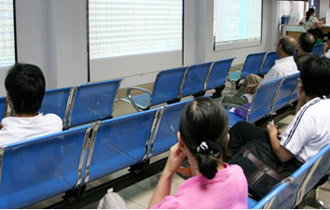|
Vietnamese securities investors feel
worried on delisting wave
A lot of
businesses have been forced to delist because they did not expose
information. Big shareholders keep complaining about the listed companies’
lack of transparency, while small shareholders say they have to seek
information from unofficial sources.
The wave of delisting
The Hanoi Stock Exchange has informed
that three companies will be forced to delist in September, namely CIC, an
investment and construction company, Trang An Securities TAS and HBP, a
packaging company.
As for the HCM City bourse, PXM, a
construction and installation enterprise is likely to be forced to delist as
its progressive loss by June 30, 2013, had reached VND249 billion, which is
even higher than its chartered capital of VND150 billion.
In cases of CIC and TAS, they have to
delist because of the serious violations of the regulations on information
exposition. Only HBP decided to delist on the voluntary basis as per the
shareholder’s meeting decision. The enterprise still makes profit, while its
share price hovers around VND10,300 per share.
As such, 27 enterprises and 3
investment funds (which have shifted into open end funds, or terminated their
operation duration) have delisted so far this year on both the
It is obvious that the number of
businesses to be delisted this year would be much higher than that in 2012
(18). Other businesses are still awaiting the death, and the decisions to
force them to delist would be released in some days.
While the number of delisted
companies is on the rise, the number of enterprises entering the bourses
remains modest. A report by the State Securities Council showed the increase
of 7 newly listed companies in the first half of the year.
Delisting means disappearing?
STT, a transport firm, has informed
about the cancelation of the report on delisting its shares at the HCM City
Stock Exchange.
At the August annual shareholders’
meeting, the delisting decision was approved by 4.65 million shares, or 76.77
percent, including the big shareholder Saigontourist and Vinh Da Steel
Company. 1,406 million did not approve the delisting, or 23.23 percent.
Hong Dung, a shareholder of STT, said
she now can sigh with relief as she has sold all the STT shares she held,
despite the 50 percent loss.
Dung began selling STT after hearing
some bad news about the company, though she was sure about the loss.
Chi, an investor at the Rong Viet
Securities Company, also said he has successfully withdrawn capital from STT,
though he had to struggle hard to do that.
According to Chi, the amount of STT
shares traded every day is very small, just tens of shares. Meanwhile,
investors have become hesitant to buy STT shares on the news about the
problems of the company.
Chi went on to say that the
companies’ delisting usually make shareholders suffer, because it is very
difficult for them to withdraw capital from “problematic enterprises”.
In many cases, shareholders cannot
sell shares, even though they know the companies’ delisting would come,
sooner or later.
The State Securities Commission has
requested the delisted companies to put their shares into transactions on
UpCom trading floor to ensure the investors’ benefits. However, not all the
delisted companies have followed the regulation.
Source: Tien Phong
|
Thứ Bảy, 21 tháng 9, 2013
Đăng ký:
Đăng Nhận xét (Atom)

Không có nhận xét nào:
Đăng nhận xét